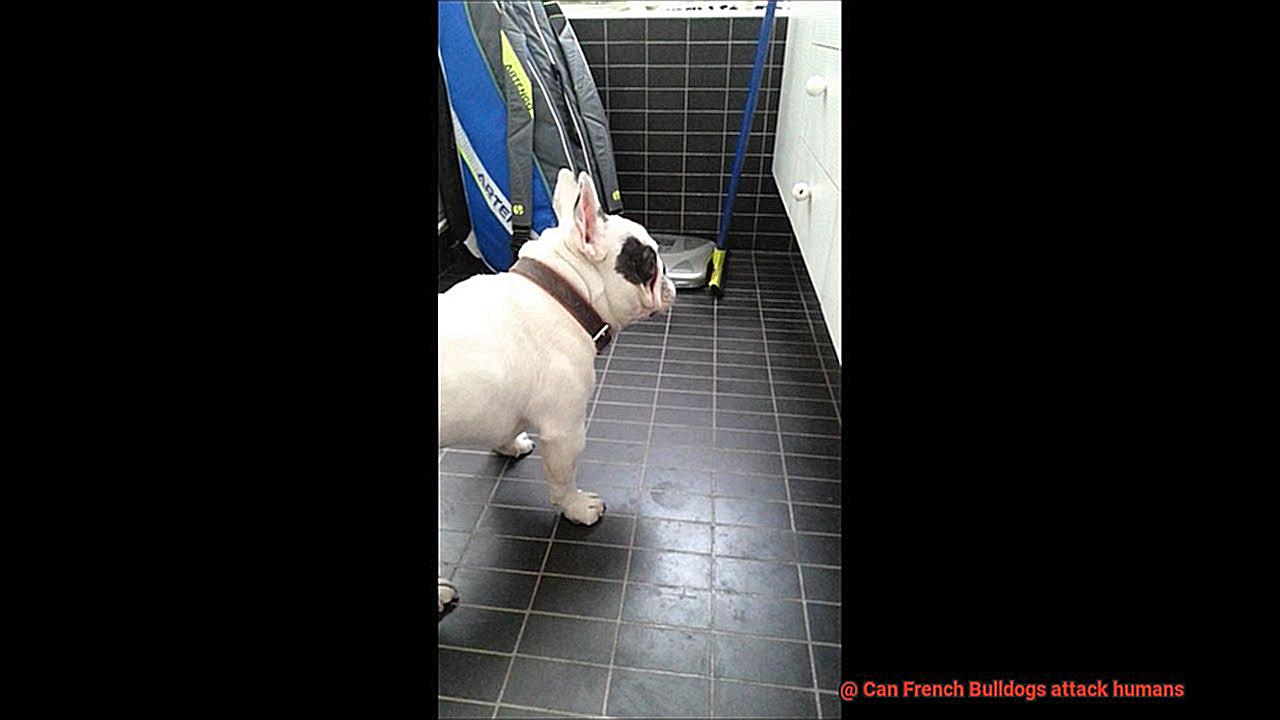Can French Bulldogs attack humans?
French Bulldogs, those little bundles of joy with their squishy faces and big personalities, have taken the dog world by storm. But here’s a thought that might cross your mind: can these adorable furballs actually attack humans? While French Bulldogs are typically known for their friendly nature, it’s worth exploring whether there’s any potential for them to turn into fierce foes.
In this blog post, we’ll dig deep to uncover the truth about whether French Bulldogs can attack humans. We’ll take a look at their breeding history, temperament, and any hidden factors that might contribute to aggressive behavior. So, if you’re a French Bulldog fan or just curious about what lies beneath those cute exteriors, stick around for some eye-opening insights that might challenge your assumptions.
Note: Remember, every dog is unique regardless of breed. This blog post aims to provide an objective view rather than fueling fears or stereotypes.
The Prevalence of Aggression in French Bulldogs
Contents
- 1 The Prevalence of Aggression in French Bulldogs
- 2 Factors That Can Contribute to Aggressive Behavior in French Bulldogs
- 2.1 Genetics – Nature’s Influence:
- 2.2 Socialization – The Key to a Well-Balanced Frenchie:
- 2.3 Training – The Path to Harmony:
- 2.4 Fear and Anxiety – A Troubled Mind:
- 2.5 Exercise and Mental Stimulation – The Power Duo:
- 2.6 Medical Conditions – The Silent Culprits:
- 2.7 Protective Instincts – A Heart of Gold:
- 3 How to Minimize the Risk of Aggression in French Bulldogs
- 4 Understanding Fear-Based Aggression in French Bulldogs
- 5 Training and Socialization Techniques for Reducing Aggression
- 6 Dealing with Health Issues That May Lead to Aggressive Behavior
- 7 Signs of Potential Aggression in French Bulldogs
- 8 How to Handle a Frenchie Who Is Showing Signs of Aggression
- 9 Conclusion
French Bulldogs are beloved companions known for their affectionate nature and charming personalities. While aggression in French Bulldogs is relatively uncommon compared to some other breeds, it is essential for owners to be aware of the potential triggers and take proactive measures to prevent and address any aggressive behavior. In this article, we will explore the prevalence of aggression in French Bulldogs, the factors that may influence it, and practical tips for promoting a harmonious relationship with your furry friend.

Prevalence of Aggression in French Bulldogs:
French Bulldogs, by nature, are friendly and gentle dogs. However, just like any other breed, they have the potential to display aggression under certain circumstances. It is important to note that the prevalence of aggression in French Bulldogs is relatively low compared to breeds commonly associated with aggressive tendencies.
Factors Influencing Aggression:
- Genetics: While genetics play a significant role in determining a dog’s behavior, it is important to note that most French Bulldogs are bred for their friendly temperament. However, certain genetic factors can contribute to aggressive tendencies in some individuals.
- Socialization: Proper socialization from an early age is crucial in shaping a French Bulldog’s behavior and reducing the risk of aggression. Exposing them to various people, animals, and environments helps them develop confidence and learn appropriate ways to interact with others.
- Training: Basic obedience training plays a vital role in preventing aggression in French Bulldogs. It establishes boundaries, teaches them to respond to commands, and fosters a strong bond between the dog and their owner.
- Individual Temperament: Just like humans, each French Bulldog has its own unique personality traits. While most French Bulldogs are known for their gentle nature, some individuals may be more predisposed to display aggressive behavior due to their individual temperament.
Addressing Aggression:
If your French Bulldog displays signs of aggression, it is crucial to seek professional help from a certified dog trainer or behaviorist. They can assess the situation, provide guidance on managing and modifying your dog’s behavior, and offer strategies to ensure the safety of both your dog and those around them. It is important to remember that aggression can be triggered by various factors, such as fear, territoriality, or possessiveness over resources.
Factors That Can Contribute to Aggressive Behavior in French Bulldogs
If you’ve ever wondered what could be behind your furry friend’s aggressive behavior, you’re in the right place. As a French Bulldog expert, I’m here to shed some light on this topic and provide you with valuable insights. So, let’s dive right in.
Genetics – Nature’s Influence:
Just like humans, our four-legged friends inherit certain traits from their parents and ancestors. Aggressive behavior can be rooted in a French Bulldog’s genes. Responsible breeders play a vital role in selecting dogs with stable temperaments, minimizing the likelihood of aggression being passed down.
Socialization – The Key to a Well-Balanced Frenchie:
Socialization is crucial for all dogs, including French Bulldogs. Early exposure to various people, animals, and environments helps them develop confidence and adaptability. Insufficient socialization can lead to fear or aggression towards unfamiliar situations or individuals.
Training – The Path to Harmony:
Every dog needs consistent and positive training to understand boundaries and appropriate behavior. Without proper training, French Bulldogs may resort to aggression when faced with challenging or stressful situations. Remember, patience is key.
Fear and Anxiety – A Troubled Mind:
Fear and anxiety can make any pup feel threatened or insecure, leading to aggressive reactions as a defense mechanism. Identifying and addressing underlying fears or anxieties is crucial for fostering a calm and well-behaved French Bulldog.
Exercise and Mental Stimulation – The Power Duo:
Despite their low energy levels compared to other breeds, French Bulldogs still require regular exercise and mental stimulation. Without these outlets, frustration and pent-up energy can build up, potentially manifesting as aggression.
Medical Conditions – The Silent Culprits:
Sometimes, aggressive behavior in French Bulldogs can stem from underlying medical conditions. Pain or discomfort caused by dental issues, injuries, or hormonal imbalances may make a dog more prone to aggression. Regular veterinary check-ups are essential to rule out any health concerns.
Protective Instincts – A Heart of Gold:
French Bulldogs are known for their affectionate nature, but they can also exhibit protective instincts towards their family or territory. When they perceive a threat, they may display aggression to defend their loved ones or their environment. Understanding the difference between protective behavior and unwarranted aggression is crucial.
Remember, every dog is unique, and while some French Bulldogs may display aggressive tendencies, most are loving and gentle companions when given the right care, training, and socialization.
I hope this guide has provided you with valuable insights into the factors that can contribute to aggressive behavior in French Bulldogs. By understanding these triggers and taking proactive measures, you can create a harmonious and loving environment for your furry friend. Stay tuned for more expert advice and tips on all things French Bulldog-related.
How to Minimize the Risk of Aggression in French Bulldogs
French Bulldogs are known for their friendly and affectionate nature, but like any dog breed, they can display aggression under certain circumstances. As responsible owners, it is crucial to understand the factors that contribute to aggression and take necessary steps to minimize the risk. In this article, we will explore practical tips that can help ensure a harmonious relationship with your French Bulldog.
Early Socialization:
Early socialization plays a vital role in preventing aggression in French Bulldogs. Expose them to various people, animals, and environments from a young age. This helps them develop good social skills and reduces the likelihood of aggressive behavior. Take your Frenchie to puppy classes, arrange playdates with other well-behaved dogs, and introduce them to different environments gradually.
Positive Reinforcement Training:
Positive reinforcement training methods work wonders with French Bulldogs. Rewarding good behavior with treats, praise, or playtime encourages desired actions and helps prevent aggression. Ignore or redirect unwanted behavior instead of using punishment, as this can exacerbate aggression. Consistency and patience are key to successful training.
Regular Exercise and Mental Stimulation:
French Bulldogs need regular exercise and mental stimulation to prevent boredom and frustration, which can lead to aggressive behavior. Engage them in daily walks, interactive play sessions, and puzzle toys that challenge their minds. A tired and stimulated Frenchie is less likely to display aggressive tendencies.
Awareness of Body Language:
Always be aware of your French Bulldog’s body language and signs of discomfort. Growling, snarling, or snapping are warning signs of potential aggression. If you observe these behaviors, address the issue immediately and seek professional help if needed. Understanding your dog’s signals can prevent escalation and ensure a safe environment for everyone.
Establish Clear Boundaries:
Establishing clear boundaries and rules for your French Bulldog is essential. Consistency in training and setting expectations helps prevent confusion and potential aggressive behavior. Teach them basic commands like sit, stay, and leave it, which provide structure and reinforce your position as the pack leader.
Spaying or Neutering:
Consider spaying or neutering your French Bulldog to reduce the risk of aggression caused by hormonal changes. Sterilization can help mitigate aggressive tendencies and promote a calmer temperament. Consult with your veterinarian to determine the appropriate time for this procedure.
Understanding Fear-Based Aggression in French Bulldogs
French Bulldogs, with their adorable faces and affectionate nature, are beloved companions for many dog owners. However, like any other breed, they can exhibit fear-based aggression. In this blog post, we will delve into the causes, signs, and management strategies for fear-based aggression in French Bulldogs.
Causes of Fear-Based Aggression
- Genetics: Some French Bulldogs may have a genetic predisposition to fear-based aggression. It is crucial to research and choose a reputable breeder who prioritizes temperament in their breeding program.
- Lack of socialization: Insufficient exposure to various people, animals, environments, and experiences during the critical socialization period (between 3 and 16 weeks) can lead to fear-based aggression later in life.
- Traumatic experiences: French Bulldogs that have experienced traumatic events such as abuse, neglect, or accidents may develop fear-based aggression as a defense mechanism.
- Inconsistent or harsh treatment: Living in an environment with inconsistent rules or harsh discipline can create anxiety and trigger fear-based aggression in French Bulldogs.
Signs of Fear-Based Aggression
Recognizing the early signs of fear-based aggression is essential for prompt intervention. Watch out for the following indicators:
- Growling: A low rumbling sound that indicates discomfort or a warning sign.
- Barking: Excessive or intense barking in response to perceived threats.
- Snapping and biting: Defensive behaviors aimed at keeping perceived threats at bay.
- Lunging: A sudden forward movement towards the perceived threat.
- Raised hackles: The hair along the dog’s back stands up as a response to fear or arousal.
- Pinned ears: Ears pressed tightly against the head, indicating fear or anxiety.
- Tucked tail: A sign of submission or fear when the tail is held tightly against the body.
- Avoidance behaviors: Hiding, cowering, or attempting to escape from the perceived threat.
Management Strategies
When dealing with fear-based aggression in French Bulldogs, it is crucial to seek professional guidance. A qualified dog trainer or behaviorist can develop a customized training plan based on your Frenchie’s specific needs. Here are some general management strategies:
- Socialization: Expose your French Bulldog to positive experiences with various people, animals, and environments from an early age. This helps build confidence and reduces the likelihood of fear-based aggression.
- Create a safe environment: Establish consistent rules and routines, provide secure spaces for relaxation and retreat, and minimize exposure to potentially stressful situations.
- Positive reinforcement training: Use rewards, such as treats or praise, to reinforce calm and non-aggressive behaviors. This helps your Frenchie associate positive experiences with previously feared stimuli.
Training and Socialization Techniques for Reducing Aggression
Training and Socialization Techniques for Reducing Aggression in French Bulldogs
French Bulldogs are known for their friendly and affectionate nature, but like any dog, they can exhibit aggressive behavior if not properly trained and socialized. Training and socialization are crucial in shaping a well-behaved and non-aggressive French Bulldog. In this section, we will explore the importance of training and socialization techniques for reducing aggression in French Bulldogs.
- Start Early: The earlier you start training and socializing your French Bulldog, the better the chances of preventing aggressive behavior. Begin training as soon as you bring your puppy home and continue throughout their life.
- Positive Reinforcement: Positive reinforcement training methods, such as using treats, praise, and rewards, are highly effective in reducing aggression in French Bulldogs. Rewarding good behavior encourages them to repeat it.
- Consistency is Key: Establish clear rules and boundaries for your French Bulldog and ensure everyone in the household follows them consistently. Inconsistent training can confuse your dog and lead to frustration and aggression.
- Socialization: Socialization involves exposing your French Bulldog to various people, animals, and environments from a young age. This helps them become comfortable and confident in different situations, reducing the likelihood of aggressive behavior. Gradual exposure to different stimuli is important during socialization.
- Obedience Classes or Professional Training: Enrolling your French Bulldog in obedience classes or working with a professional dog trainer can be beneficial in teaching them proper behavior and preventing aggression. These classes provide structured training environments that allow your dog to learn and interact with other dogs and people.
- Monitor Signs of Aggression: It is important to monitor and address any signs of aggression early on. If your French Bulldog shows any signs of aggression, seek professional help from a veterinarian or animal behaviorist who specializes in aggression issues.
- Exercise and Mental Stimulation: Proper exercise and mental stimulation are also important for reducing aggression in French Bulldogs. A tired and well-exercised dog is less likely to exhibit aggressive behaviors. Provide daily exercise and engage in interactive play sessions with your French Bulldog.
Remember, punishment-based training methods should be avoided as they can increase fear and anxiety, leading to more aggressive behavior in French Bulldogs. Instead, focus on positive reinforcement and consistent training techniques.
Dealing with Health Issues That May Lead to Aggressive Behavior
French Bulldogs are adorable little bundles of joy, but just like any other breed of dog, they can sometimes exhibit aggressive behavior. However, it’s important to understand that aggression in dogs is often a result of underlying health issues rather than inherent temperament.
So, let’s dive into the world of French Bulldog health and explore how certain health problems can contribute to aggressive behavior.

- Dental Problems: Imagine having a toothache that just won’t go away. Ouch. Dental pain can make anyone grumpy, and it’s no different for our furry friends. French Bulldogs with dental problems may become defensive and aggressive when their mouths are touched or examined. Regular dental care, including routine cleanings and check-ups, can help prevent dental issues and reduce the likelihood of aggression associated with oral discomfort.
- Hormonal Imbalances: Ahh, hormones, they can wreak havoc on our emotions. Unneutered male French Bulldogs, for example, may exhibit aggressive behavior due to increased testosterone levels. Spaying or neutering your French Bulldog can help regulate hormone levels and reduce the risk of aggression associated with hormonal imbalances.
- Neurological Conditions: Sometimes, aggression is not a matter of choice but a result of an underlying neurological condition. Epilepsy, brain tumors, or other neurological disorders can affect a French Bulldog’s temperament and lead to sudden outbursts of aggression. If your furry friend displays uncharacteristic aggression or other abnormal behaviors, it’s crucial to consult with a veterinarian to rule out any underlying neurological conditions.
- Medications and Treatments: Who knew that even medications could affect a dog’s behavior? Certain medications or treatments prescribed for various health issues may have side effects that can alter a French Bulldog’s behavior. It’s important for owners to be aware of any potential behavioral changes associated with the medications their French Bulldogs are taking and consult with their veterinarian if they notice any concerning aggression or changes in behavior.
By addressing and treating underlying health issues, you can significantly reduce the risk of aggression in your French Bulldog. Regular veterinary check-ups, proper dental care, and spaying or neutering can contribute to your furry friend’s overall health and wellbeing.
Remember, not all French Bulldogs will exhibit aggression. Proper socialization, training, and a nurturing environment are essential in shaping a dog’s behavior and temperament. Understanding your French Bulldog’s needs, providing a loving and structured environment, and seeking professional help if necessary can help ensure a harmonious relationship between you and your furry companion.
Signs of Potential Aggression in French Bulldogs
French Bulldogs are known for their friendly and affectionate nature, but like any other breed, they can display signs of aggression under certain circumstances.
While aggression is not a common trait in French Bulldogs, it’s important for owners to be aware of the signs to ensure the safety of their furry friends and others around them. So, let’s dive into the world of potential aggression in French Bulldogs.
- Growling and Snarling: Picture this – you’re walking your French Bulldog in the park, and suddenly, they start growling or snarling at a passerby. This is a clear indication that your furry friend is feeling threatened or uncomfortable. It’s important to intervene and remove them from the situation to prevent any escalation of aggression.
- Biting or Snapping: When a French Bulldog resorts to biting or snapping, it’s a more serious form of aggression. This behavior can be triggered by fear, territoriality, or a perceived threat to their safety. Addressing this behavior promptly is crucial to prevent any harm.
- Raised Hackles: Have you ever noticed the hair along your French Bulldog’s back standing up? This is called raised hackles, and it’s a sign that they are experiencing heightened emotions, which could potentially lead to aggression. Keep an eye on them and try to identify the trigger for their unease.
- Stiff Body Posture: A French Bulldog’s body becoming stiff and rigid can be an indicator of aggression. They may hold their body upright with their tail held high or wagging rapidly, which can signify excitement mixed with aggression. It’s important to address this behavior before it escalates further.
- Lunging or Charging: If your French Bulldog starts lunging or charging towards people or other animals, it’s a clear sign of aggressive behavior. This action may be accompanied by barking or snarling, indicating that they are ready to defend themselves or their territory. Training and socialization can help prevent these aggressive tendencies.
- Excessive Barking: While barking alone may not necessarily indicate aggression, excessive and persistent barking can be a sign that your French Bulldog is feeling anxious, threatened, or territorial. Identifying the underlying cause of the barking is crucial to prevent it from escalating into aggressive behavior.
- Guarding Behavior: French Bulldogs may display aggression when it comes to guarding their food, toys, or territory. They may growl or snarl if someone approaches their possessions, and in extreme cases, they may even bite to protect what they consider theirs. Proper training and positive reinforcement can help address this behavior.
How to Handle a Frenchie Who Is Showing Signs of Aggression
French Bulldogs are known for their friendly and affectionate nature, but like any dog breed, they can show signs of aggression. While aggression is not common in French Bulldogs, it’s important to understand the underlying causes and take appropriate action to prevent harm. In this article, we will explore how to handle a Frenchie showing signs of aggression.
Recognize the signs:
Aggression in French Bulldogs can manifest as growling, snarling, barking, lunging, or biting. It’s crucial to identify these early warning signs and address them promptly.
Understand the root cause:
Aggression can stem from fear, anxiety, territoriality, resource guarding, or even pain or illness. Consult with a veterinarian or professional dog behaviorist to determine the cause and create an effective plan.
Properly socializing your Frenchie from an early age helps them develop positive associations with people, animals, and environments. This reduces the likelihood of aggressive behaviors later on.
Establish yourself as the pack leader:
Consistency in training and discipline is key to preventing dominant or aggressive behaviors. Set clear boundaries and rules for your Frenchie to ensure they understand what is expected of them.
Implement desensitization and counterconditioning techniques:
Gradually expose your Frenchie to triggers that elicit aggression while rewarding calm behavior. Seek professional help from a certified dog trainer or behaviorist for guidance.
Prioritize safety:
Never punish or use harsh methods with an aggressive Frenchie, as it can worsen the aggression. Focus on positive reinforcement, reward-based training, and creating a safe environment.
jJasT9ZEGy0″ >
Conclusion
In conclusion, it is important to recognize that while French Bulldogs are generally known for their friendly and affectionate nature, there is still a possibility for them to exhibit aggressive behavior. While rare, instances of French Bulldogs attacking humans have been reported.
It is crucial for owners and individuals to be aware of the factors that can contribute to aggression in any dog breed, including French Bulldogs.
It is worth noting that aggression in French Bulldogs can often stem from improper breeding practices or inadequate socialization and training. Responsible breeding and early socialization can significantly reduce the likelihood of aggressive tendencies in these dogs.
Furthermore, it is essential for owners to provide proper care, attention, and training to their French Bulldogs. Regular exercise, mental stimulation, and positive reinforcement training methods can help prevent behavioral issues that may lead to aggression.
Additionally, it is important for individuals encountering any dog breed, including French Bulldogs, to approach them with caution and respect. Understanding canine body language and recognizing signs of fear or discomfort can help prevent potential incidents.
While the overall risk of a French Bulldog attacking humans may be relatively low compared to larger breeds or certain other dog breeds with higher prey drive or guarding instincts, it is always wise to prioritize safety when interacting with any dog.
In summary, while French Bulldogs are generally friendly companion animals with a low propensity for aggression towards humans, it is crucial to remember that individual temperament can vary.




